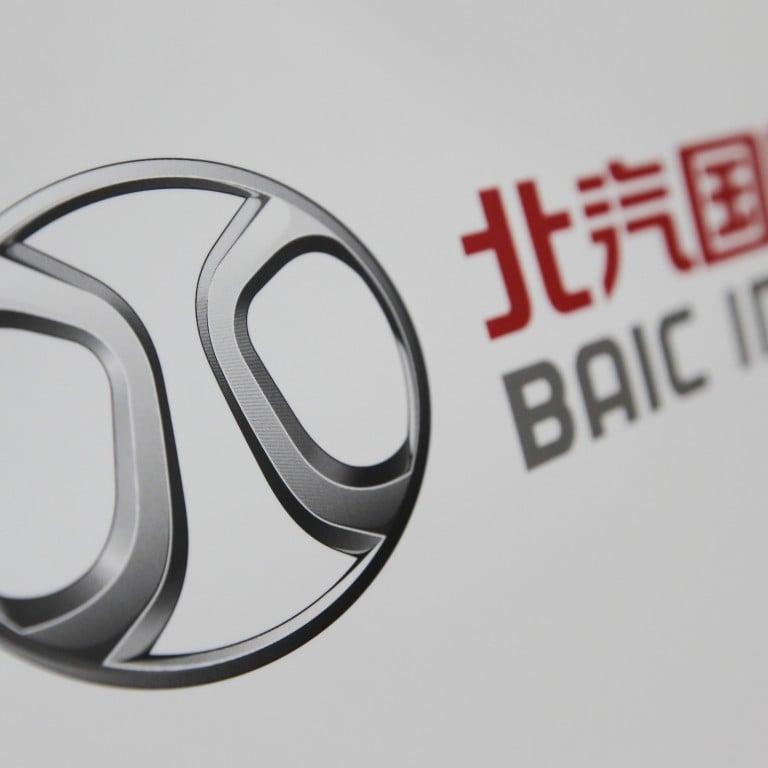
BAIC's showpiece IPO reveals much about the true state of SOE reform
As the crown jewel of Beijing's municipal government, BAIC listing carries political weight but isn't an example of SOE reform
How real is the mainland's much-talked-about state firm reform? The listing of one mainland carmaker is quite telling.
BAIC Motor, which makes vehicles with Daimler and Hyundai Motor, planned to raise about US$3 billion in a Hong Kong initial public offering during the summer.
However, investor appetite was tepid given its aggressive planned price-earnings ratio of 18 times. Three weeks ago, the firm's management told underwriters to postpone the listing application to November, which would have moved the listing to early next year.
That decision was overturned within a week. The carmaker filed its application early this month, lowering its PE ratio to between 12 and 15 times in return for a listing this autumn.
Why? The Hang Seng Index had rebounded from its late-June bottom but was still lower than the level a month before. Market sentiment was no justification.
State firm veterans pointed to rivalry among provincial-level administrations, in particular Beijing and Shanghai, eager to show they were the most faithful supporter of President Xi Jinping's state-owned enterprise reform.
When reform itself has little substance … showpieces are of political importance
Churning out more than 200,000 cars and three billion yuan (HK$3.7 billion) profit last year, BAIC is the crown jewel of Beijing's municipal government.
After the listing, its shareholders will include the municipal government, German carmaker Daimler, the public and several so-called independent enterprises. Daimler will own a 12 per cent stake, the largest of its kind.
Its 15-strong board will include only one executive director, two Daimler-appointed directors and five independent ones.
On the surface, it's a perfect example of Xi's reform, which emphasises the turning of SOEs in non-monopolised sectors from "state-owned" to "mixed ownership".
Delaying its listing until the first quarter of next year was not acceptable, first because an autumn listing would be just in time to celebrate the impending anniversary of Xi's reform plan, which was announced last November.
Second, as in any contest, no one would remember the runner-up. Shanghai's municipal government is understood to be actively studying the listing of its major investment arms.
Yes, a listing now will cost the carmaker many millions of dollars given the lower valuation; but political credit is never too expensive.
When reform itself has little substance or has made negligible progress, such "showpieces" are of particular political importance.
Other than the controversial listing of Citic Group, the reform has seen little in the way of the sale of state assets to private entrepreneurs and a lot of empty policy directives issued by different provincial governments.
The emptiness is best illustrated by one issued by Shanghai this week, which set an aggressive target of completing SOE reform within three to five years. Yet, many were disappointed.
"It repeats the slogan but provides no operational details," said one SOE manager.
The directive said state firms in non-monopolised and non-strategic industries would be encouraged to move into mixed ownership. It also said firms with mixed ownership could introduce share incentive schemes for their staff.
Yet, there was no definition of mixed-ownership enterprises, nor did it say how such a firm's business decision-making, staff deployment and appraisals would differ from that of state-owned firms.
No wonder the chairman of privately owned Fuyao Glass said he would not put in a teaspoon of salt when the state had a whale in the pot. Why put your money in if it gives you no say?
Of course, everyone knows the issue. There are endless "seminars" to discuss the reform (they don't call them meetings now because the new leadership said there should be fewer meetings). However, not many dare to touch the crux of the issue - the Communist Party's role in mainland business.
Like the other state firms, BAIC's decision making is under the firm control of the party. Eight of its 15 directors are from the state or state enterprises.
Therefore, showpiece or not, BAIC exhibits no fundamental difference from the hundreds of state firms that have listed over the past 20 years.

